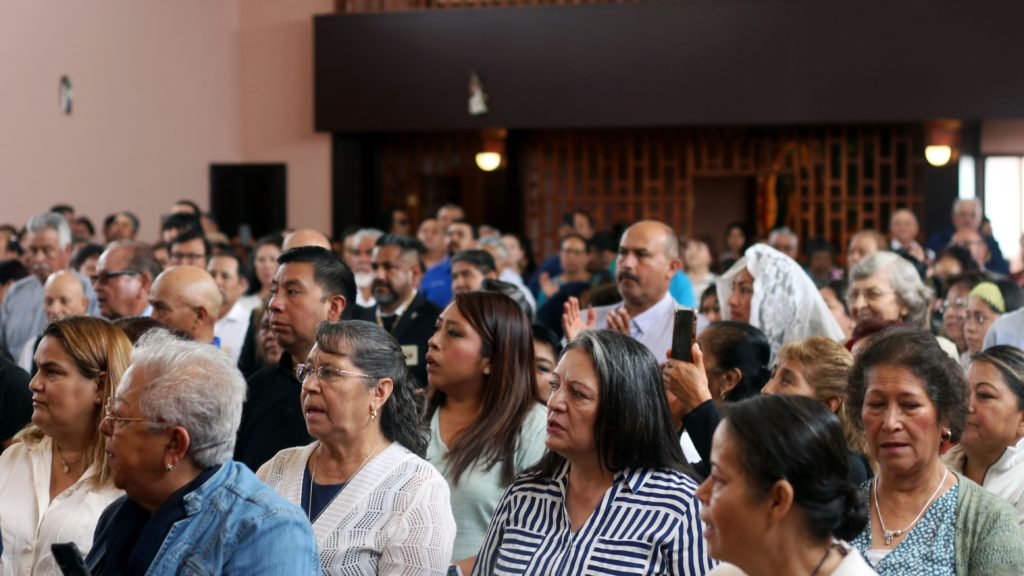In the months since the November 2024 elections, Isaac Cuevas has gone from parish to parish saying the same things at educational workshops for immigrants.
Amid concerns that the new Trump administration would toughen immigration laws and ramp up deportations, Cuevas, who works as director of immigration and public affairs for the Archdiocese of Los Angeles, invited anxious parishioners to take a “Know Your Risk” approach to clear up misinformation and false rumors about immigration enforcement.
“Every time I gave this presentation, it was like, look: ‘These are the priorities that ICE (U.S. Immigration & Customs Enforcement) focuses on. They don’t go out on the streets, and they don’t pick people up because that’s racial profiling.’ ”
But Cuevas would end every presentation with a disclaimer: “This is what we know today. This can all change tomorrow.”
Sure enough, it did.
Since the first June 6 raids in downtown LA’s Fashion District, all that guidance is “out the window,” Cuevas said, as immigration agents raided garment factories, car washes, and store parking lots in search of people without legal status to arrest and deport.
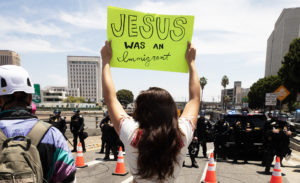
The sweeps represent a shift from the Trump administration’s previous policy of targeting undocumented immigrants with criminal backgrounds for arrest and deportation.
In some majority-Hispanic neighborhoods, checkpoints have been set up on city streets, while agents have been seen stopping people on sidewalks in seemingly indiscriminate fashion. Parks are empty, as are some stores. Many popular food vendors are missing from their regular spots.
For Catholics, the result has been a climate of fear. Several Los Angeles priests contacted by Angelus noticed fewer parishioners at daily and Sunday Masses in the week after the initial June 6 raids. Retreats and ministry meetings were canceled. At least one parish had to postpone first Communions.
“It feels like COVID again. People are hiding,” said one priest who serves in a parish in a heavily Latino suburb of LA.
To make people feel safe at his parish, during Masses a team of parish staff with walkie-talkies lock entry points to the parish property — parking lot gates, church doors — after the First Reading.
“If someone wants to get in [for Mass] after that, they have to knock, and if they’re not ICE, we let them in,” said the priest, who requested anonymity to protect the identity of his parish. Some neighboring parishes in the deanery have followed similar procedures, the priest said.
Parishioners who have witnessed sweeps in places like a nearby Walmart parking lot were rattled by how arbitrary the stops seemed.
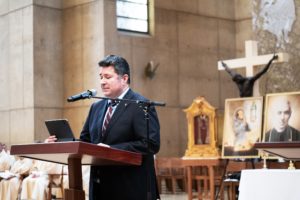
“You look like you don’t have papers, they just stop you. If it looks like you don’t comply, they just take you,” said the priest. “At this point, it’s just profiling. How can they know?”
Cuevas confirmed that as of press time, there had been no immigration enforcement operations conducted on church property in the archdiocese. But at least one encounter came uncomfortably close.
In Downey, a video shared widely on social media showed several unmarked ICE vehicles surrounding a Hispanic man riding his bicycle in front of Our Lady of Perpetual Help Church. Agents emerged to question the man while bystanders recorded the encounter with their phones.
After a few minutes, the agents “were satisfied and decided not to pursue,” said Msgr. Michael Meyers, temporary administrator at the parish.
At Our Lady of Lourdes Church in East LA, administrator Father Ricardo Gonzalez, SVD, described a climate of paranoia that has set in, with people worried about what others may suspect about their legal status if they don’t show up to work or even church services.
“This is dividing the community,” said Gonzalez, who has witnessed multiple raids while walking the streets of his neighborhood.
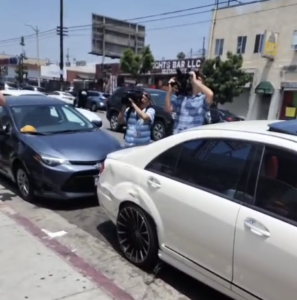
Gonzalez believes one lasting consequence of the raids will be the loss of credibility of law enforcement officers, who people perceive as not protecting the community from the raids. Perhaps even more serious, he believes, is the toll that so much fear and anxiety is taking on people’s mental health.
“It’s going to hurt our [parish] finances, but that’s not as important as the damage this is causing to our psyche,” said Gonzalez, a native of Mexico who was ordained in Argentina. “Our parish structure is very limited; we weren’t ready for this.”
Since the June 6 raids, Cuevas’ office has been flooded with calls, e-mails, and messages from parishes and families around the archdiocese. Many ask for guidance and advice on “what’s safe and what’s not safe,” said Cuevas.
Others inquire about ways they can help.
“It’s been a whirlwind,” said Cuevas. “It’s been nonstop, trying to respond to everybody who understands that this is unprecedented. There’s been an outpouring of support for a community that’s hurting.”
Just a few weeks ago, Cuevas gave an immigration workshop at St. Joseph’s Church in Carpinteria, where many parishioners are Hispanic immigrants who work in the nearby orchards and nurseries.
While the area hasn’t seen the kinds of sweeps being conducted in LA, pastor Msgr. Richard Martini said he’s noticed a lot of suffering among the youngest of his flock.
“The biggest anxiety is with children,” said Martini. “Children are anxious that their parents might be deported.”
Catholic Charities’ St. Margaret’s Center in Lennox mostly serves immigrant families, some of them close to homelessness. But since the raids, which included sweeps in nearby Inglewood and Westchester, director Mary Agnes Erlandson has seen fewer of them accessing their services, which include a food pantry and a program that distributes diapers and baby supplies to families.
The center has been working to reach out to households with members who’ve been detained to send help. But the climate of fear makes it even more difficult.
“Families may be in need of food but fearful to go to grocery stores,” said Erlandson. “If any communicate that to us, we'll work with volunteers to try to get food to them. But until the raids stop, the fear and trauma will be there.”
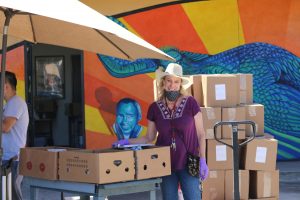
As arrests and deportations continued into a second week, Cuevas' office is working to establish migrant ministry groups in several "key parishes" to offer information and support.
But in the meantime, Cuevas says he's been especially impressed by the courage of LA priests serving immigrant communities in their parishes while participating in prayer vigils and marches.
“There are priests who are taking a very vocal stance on this,” said Cuevas. “The clergy of this archdiocese realize this is happening in our backyard, and they’re being a public witness to the need for compassion and understanding.”
Cuevas said that while the circumstances around immigration enforcement have changed suddenly, his job description hasn’t.
“The [Catholic] Church doesn't typically get involved in law or policy until those laws and those policies are unfair and unjust. And that’s when we’re called to be prophetic, and to defend people who can’t defend themselves.”
